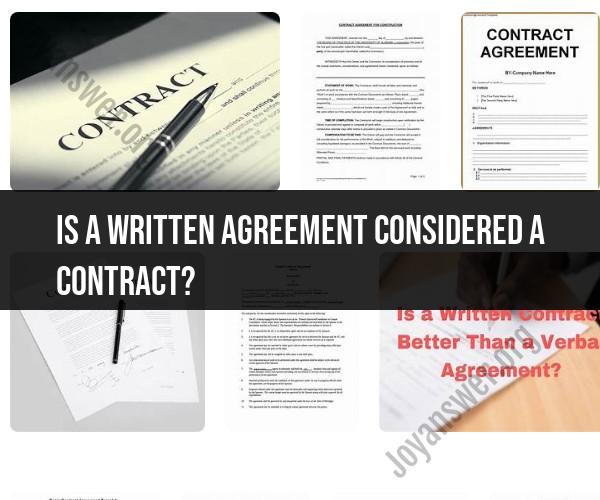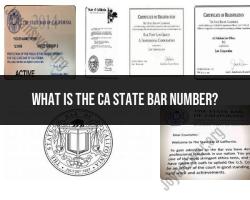Is a written agreement considered a contract?
Yes, a written agreement is typically considered a contract if it meets certain legal requirements. In most legal systems, including the United States, a contract is a legally binding agreement between two or more parties that outlines their rights and obligations. For an agreement to be considered a contract, it generally must meet the following elements:
Offer and Acceptance: There must be a clear and unequivocal offer made by one party and an acceptance of that offer by the other party. Both the offer and acceptance should be communicated between the parties.
Intention to Create Legal Relations: The parties must intend for the agreement to have legal consequences. Social and domestic agreements are usually not considered contracts, but business and commercial agreements typically are.
Consideration: There must be something of value exchanged between the parties as part of the agreement. This is often referred to as "consideration" and can be in the form of money, goods, services, or a promise to do or not do something.
Legal Capacity: Both parties must have the legal capacity to enter into a contract. This means they are of legal age and mentally competent.
Legal Purpose: The purpose of the contract must be legal. Contracts with illegal objectives, such as contracts to commit a crime, are generally not enforceable.
Certainty and Possibility of Performance: The terms of the contract should be clear and specific, and the obligations outlined should be possible to perform. Contracts that are too vague or impossible to perform may not be enforceable.
Consent: Both parties must enter into the agreement voluntarily and without duress or fraud. If one party is coerced or misled, the contract may be voidable.
A written agreement can serve as evidence of the contract and can make it easier to prove the terms of the agreement in case of a dispute. While verbal contracts can also be legally binding, they may be more challenging to enforce, as it can be difficult to prove the terms agreed upon. In many cases, a written contract provides greater clarity and protection for all parties involved.
It's important to note that contract law can vary by jurisdiction, and there may be additional requirements or considerations based on local laws and regulations. If you have questions about a specific agreement or contract, it's advisable to consult with a legal professional who can provide guidance based on the relevant laws in your jurisdiction.
Is a Written Agreement Considered a Legally Binding Contract?
Yes, a written agreement is considered a legally binding contract. However, there are certain requirements that must be met in order for a written agreement to be legally enforceable. These requirements include:
- Offer and acceptance: There must be a clear offer and acceptance of the terms of the agreement.
- Consideration: Both parties must exchange something of value in order for the contract to be enforceable.
- Mutual consent: Both parties must agree to the terms of the contract without coercion or fraud.
- Capacity: Both parties must have the legal capacity to enter into a contract. This means that they must be of legal age and of sound mind.
- Lawfulness: The contract must be for a legal purpose.
The Legal Validity of Verbal and Written Agreements
Both verbal and written agreements can be legally binding. However, written agreements are generally more enforceable than verbal agreements. This is because written agreements provide a clear record of the terms of the agreement and the signatures of both parties.
In some cases, a verbal agreement may be enforceable if it is supported by other evidence, such as emails, text messages, or witness testimony. However, it can be difficult to prove the terms of a verbal agreement in court, which is why it is always best to put agreements in writing.
Formalizing Agreements with Written Contracts
A written contract can be formalized in a number of ways. One common way is to have a lawyer draft the contract. This is a good option for complex agreements or agreements that involve a significant amount of money.
Another option is to use a pre-made contract template. There are many different contract templates available online and in legal forms stores. These templates can be a good option for simple agreements, such as a lease agreement or a non-disclosure agreement.
No matter what type of written contract you use, it is important to have it reviewed by a lawyer before you sign it. This will help you to ensure that the contract is fair and that it protects your interests.
The Role of Signatures and Witnesses in Contract Documentation
Signatures and witnesses are important in contract documentation because they help to prove that the contract was validly entered into.
When you sign a contract, you are essentially saying that you agree to the terms of the contract. Witnesses can also attest to the fact that you signed the contract freely and without coercion.
In some cases, a contract may be valid even if it is not signed. However, it is always a good idea to have a contract signed by both parties and witnessed by at least one person. This will make it more difficult to challenge the validity of the contract in court.
Enforcing Written Contracts and Resolving Disputes
If there is a dispute over a written contract, either party can file a lawsuit in court to enforce the contract. The court will then review the contract and the evidence presented by both parties to determine whether the contract is valid and enforceable.
If the court finds that the contract is valid and enforceable, it may order the other party to comply with the terms of the contract. The court may also award damages to the party who was harmed by the other party's breach of contract.
In some cases, the parties to a contract may be able to resolve their dispute without going to court. One way to do this is through mediation. Mediation is a process in which a neutral third party helps the parties to reach a mutually agreeable resolution.
Another way to resolve a contract dispute is through arbitration. Arbitration is a process in which a neutral third party makes a binding decision on the dispute. Arbitration is often faster and less expensive than going to court.
Conclusion
Written contracts are an important tool for protecting your interests when entering into agreements with others. By following the tips above, you can create and enforce written contracts that are legally binding and enforceable.











